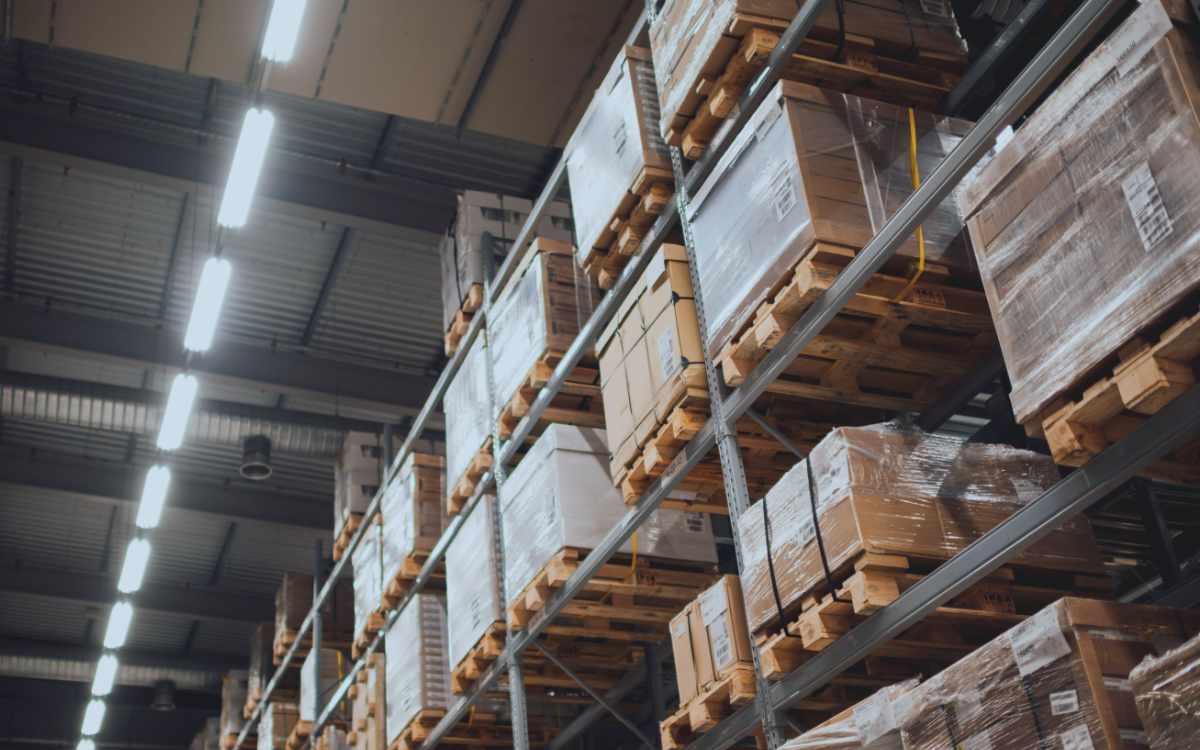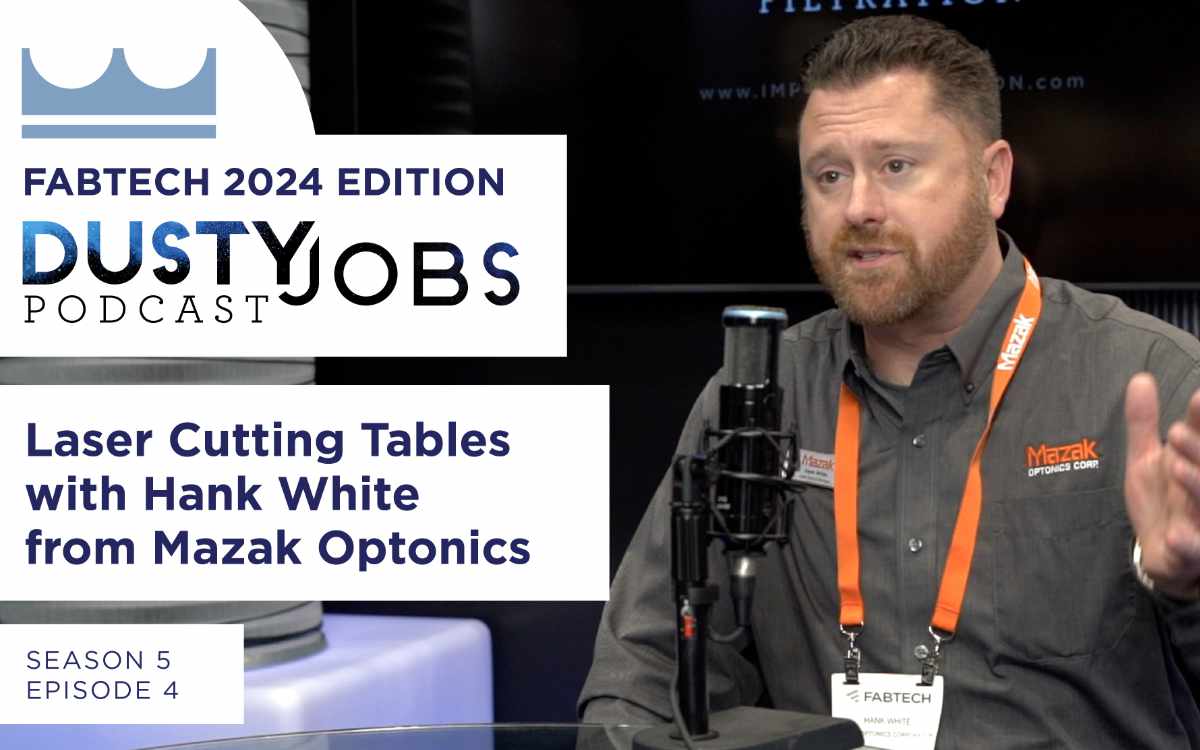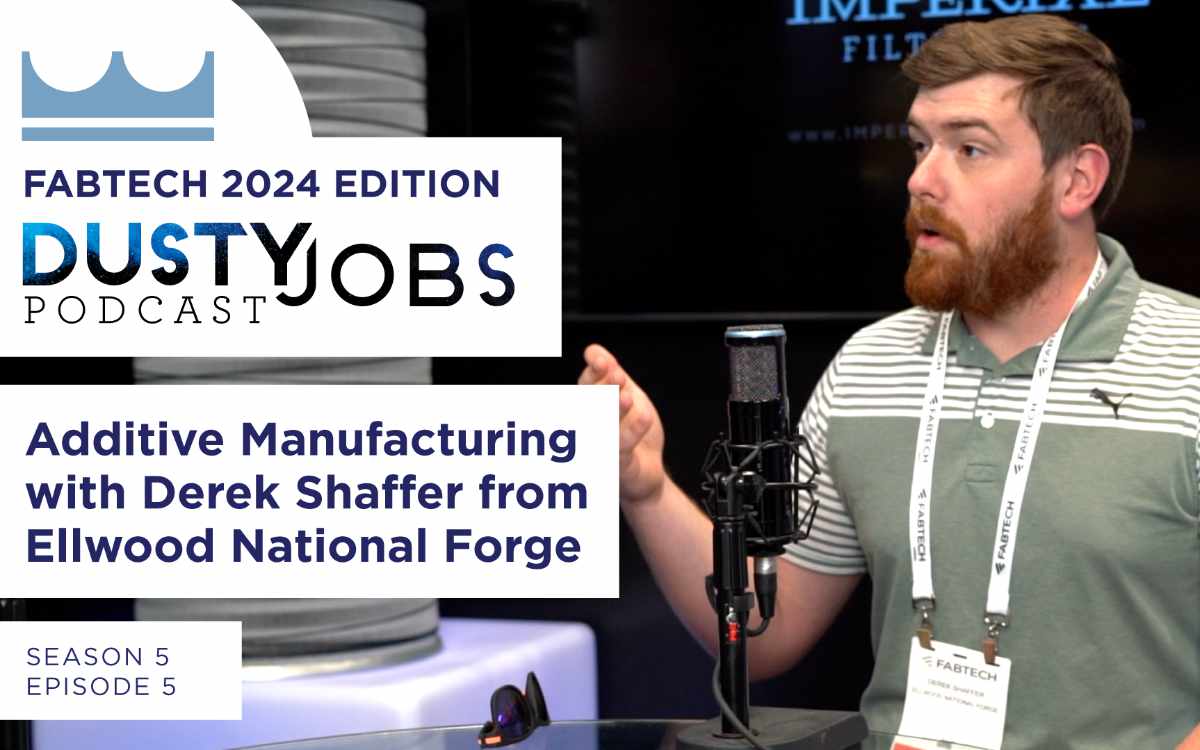We have Beau back for the Three-Peat! This is the third time Beau Wigington has graced our podcast at Fabtech. He sits down with Donovan and talks about what he has seen at the Orlando show for new tech and people. He also discusses new content and happenings at @Welddotcom . They also talk about how dust collection works in other parts of the world.
Narrator: Welcome to the Dusty Jobs podcast from Imperial Systems. Industry knowledge to make your job easier and safer.
Donovan: Hello, welcome to another episode of the Dusty Jobs podcast. Still at Fabtech, still meeting people. We got Beau from Weld.com on again.
Beau: Three Pete baby.
Donovan: Yeah, third year in a row.
Beau: Yep.
Donovan: Yeah, I love catching up with you because a lot of times I’m here at the booth and I’m meeting people, talking to people about fume collection, but you –
Beau: I’m a nomad.
Donovan: You get to go out and see the whole show.
Beau: Oh yeah.
Donovan: So you’re going to be the man on the beat for us this year.
Beau: Alright.
Donovan: And tell us what is Beau seeing at the show so far that you’ve learned about, maybe it’s interesting to you. We’re all about learning about new things.
Beau: So the first thing I learned about this year was we visited a company called, they have a machine called the Beam Champ. And it has the ability to lift like girders you find, like you put in the ceilings and everything. Like these giant beams, it can roll it like nothing and place them. And so we went and saw that in action, which was pretty cool.
Donovan: That’s awesome.
Beau: Like I didn’t know what that was all about. I didn’t know it was something that happened, but they build like all the like Amazon facilities and everything, like using these crazy, crazy contraptions they have. We’re going to hopefully go check out that in action next year. And then saw, I learned about markers. I just did a podcast with Markal.
Donovan: Like a marker, like the thing you…
Beau: Yeah. No, there’s a lot of science that goes into markers because like in welding you’re going to deal with not just a clean surface every time. Sometimes you’re going to have an oily surface. They have a marker for that. Like you can write right through the oil and it just runs away from it. It’s really wild. They have glow in the dark markers. They have ones that can go over course surfaces and not like break up. It was… I really learned a lot on that podcast.
Donovan: Yeah. Well, and that’s the crazy and great thing about Fabtech that, you know, people who are in the industry, you can come here and learn about new things, different things, an oil marker. You could be having a problem. You didn’t know the answer was two.
Beau: And it’s here.
Donovan: You could find it here.
Beau I did a podcast with Gentex. They make all of the helmets for… Or most of the helmets for the military. But they also have a PAPR system, but it’s all one. Like it’s just one piece. There’s no like backpack or anything like that.
Donovan: Oh, it’s all in the helmet.
Beau: Mm-hmm.
Donovan: Oh, that’s great.
Beau: I know that might not be something I’m talking about because we’re fume extracting over here.
Donovan: Well, you and I were talking a little bit earlier about this too, how it’s like, you know, we want… We’re all about the health and safety of workers going home better to their families. And sometimes you can’t capture everything with a fume collector. You got to have… And sometimes people get into welding some stuff that’s nasty stuff.
Beau: Yeah.
Donovan: And, you know, you need that personal protection at that time. But what happens when you take that helmet off, right?
Beau: You’re right back in the blue fog.
Donovan: Yeah, you don’t want that all floating around you. So there’s situations that… What are you going to do? You want to pump it outside? You want the neighbors to breathe that, the kid playing the ball down the street? You don’t want that. So that’s where we come in with those companies to help make sure that the worker’s safe and the environment’s safe and it’s not drifting into the office space or whatever. So we want to not just make sure you’re safe while you’re welding, but when you’re done or that piece of equipment that’s running beside you, even though you take it off, that could be producing stuff. And we just want to keep everybody safe. So that’s not… There’s all types of safety out there that we’re just one part of it.
Beau: Yeah. Well, it never really clicked to me, like before you said it, that you don’t want to pump it outside because a lot of people will have a box fan in their window just pumping it out. But I never even thought about this isn’t pumping outside.
Donovan: No.
Beau: I thought I was like pumping it out.
Donovan: No.
Beau: It’s collecting it?
Donovan: It’s collecting it. So ours is a fume collector. It’s taking all the things that we shouldn’t be breathing in, you shouldn’t be breathing in, it’s not good for anybody. We’re collecting it into that filter and then we’re taking that air and we’re pumping it back in so that you have a clean air in your shop or clean air outside for everybody else who’s living around the facility.
Beau: Hey. Win-win.
Donovan: It is. I mean, I don’t think, you know, back in the day we used to have smog filled cities and things like that. I don’t think anybody wants to go back to that. I think we all want to have cleaner air. And I know it’s not something that’s glamorous or makes the company a lot of money, but in the end it’s probably better for everybody who’s involved around it.
Beau: Yeah. Well, that’s been a hot topic with all the podcasts I’ve been doing this year. Everyone wants to talk about safety. That one was about respiratory safety and all the things that… I mean, I meet a lot of welders. I go and visit a lot of welders and overseas, like, PAPRs are mandated. It’s like you have to have a PAPR on. Over here, they’re not. And we do a bunch of videos where we don’t have a PAPR on and we get a lot of people saying, “Hey, hey, you guys aren’t cowboys. You’ve got to protect yourself.”
Donovan: Right.
Beau: Because it’s just so different out here. I don’t think people in America are quite as educated to the negative effects of welding that comes from the fumes. Or if they are, they just don’t care, man. It’s weird.
Donovan: Yeah. I know I wouldn’t want my children to breathe in a lot of that. So to anything you can do to try to help clean that air up. In not every situation you can have that or whatever, but at least you could start cleaning the air in your shop to make it better. And that’s what we’re trying to do is help the health and safety of the factors. I like to always say, in Imperial Systems, you come to our place, you’re going to look across the way and you’re going to see a cornfield.
Beau: Or you’re going to see a big old model of your entire thing.
Donovan: That’s true. But it’s literally just a bunch of middle class guys that are welding equipment together for other middle class guys that we’re all just trying to go home better to our families at the end of the day. So tell me more about Weld.com. Now we were talking, you said there’s been some stuff you guys started shifting last year.
Beau: Mid-shift. We shifted. So traditionally Weld.com was like, we would teach you how to passing certification tests or getting started in MIG and TIG and all the different processes. We still make those videos, but we added another element where we’ve been, I think we’ve been on nine or ten trips this year traveling to different cities.
Donovan: You’ve been busy, man.
Beau: Yeah. It’s been real busy. But we’ve just been traveling, doing many tours. Welding tours, I like to say. But we, so we’ll go to a town for a day, make a couple videos with one shop, and then we’ll go and visit another one. Because we’re trying to show people where you actually take these skills after school or after learning. Because a lot of people, I know I probably have said it every year, I’ve been on the podcast, but a lot of people in the industry, they think you could be in manufacturing, you could be in structural welding, or you could be in pipe welding. And that’s the narrow scope that people have when they get into the industry. Right. And so my goal with Weld.com has always been show people everything else you can do so that more people might be interested. You know, not every kid out there is like, you know what, I want to go and weld pipe. You know, that’s not every kid.
Donovan: Yeah.
Beau: Some people are like, I want to go and weld spaceships. I want to go and weld boats. I want to go and weld like phone case, like phone components with a laser welder or stir friction welding. You know, there’s all kinds of different things that it’s not the dirty, gross job that everybody used to think it is.
Donovan: Right.
Beau: There’s a lot of different pathways. And then on the other side, you know, outside of welding, there’s endless supplies of jobs at companies like this where if you’re a welder, you have a particular skill that maybe you don’t know about. You know, it’s like how do you like what process is going to produce the most smoke, you know, like welders will know that.
Donovan: Yeah. And I have been seeing, I don’t know if you guys have been seeing this, but a little bit too that the robotic welding is a thing. It’s here.
Beau: Big thing. Big, big thing.
Donovan: Its in our shop with our robotic welder, we have one of our best welders on that piece of equipment because that’s the guy who knows how to check it and make sure it runs well. Like we didn’t want just somebody who knows how to push a button. We want an experienced good welder on that piece of equipment because it’s very important to us to make sure that whoever’s running it can know what a quality weld is and what it looks like and how it should be done.
Beau: The way I like to tell people, like, because I talk to people about automation all the time and people are afraid of it, you know, and it’s like you still need someone. It’s like teaching a student every time. It’s like teaching someone exactly how to weld what you want. That’s what you have to do with a robot. Like it’s not just like, oh, let me go to program this unless you already programmed it and taught it to do that. Like you have to show it and you have to program that out. But to do that, you need to know how to make that weld. Okay. We’ve programmed it. It’s running that welder that’s experienced. They can hear when there’s maybe, oh, they’re getting porosity because they don’t have gas going.
Donovan: Right.
Beau: They can hear, oh, it sounds like the stick out’s too far and that’s raising my amperage and it’s going to give me a different type of weld. Maybe give me undercut. Like all these, all these things that a welder is used to hearing and knowing exactly what that is or seeing it. They can see that the robot doesn’t care. Like the robot is just going to complete what you tell it to do. So that’s why there’s that big, big stop button. Because if you know something’s going wrong, you fix it before you keep going.
Donovan: Yeah. And that’s where I think you’re a hundred percent right where people are, they’re probably just a little bit scared of it because we haven’t had as much experience with it. And I know in our shop, there’s still, there’s certain things that our robot can do and it’s, it’s the things that bore people to death when they have to weld all day long. And, but then all the things that take like skill and knowledge and understanding and actually the more custom work that’s more enjoyable is the stuff that we still have to have people do at our shop. So, so yeah, I think robots have their spot, but I don’t see people going away anytime soon either.
Beau: No. Well, that was one of the videos we recently did. We went out to a robotic pipe welding company. So they use these bug welders that are welding like 36 inch pipe, like pipeline pipe. And it takes two welders to run the two bugs. And we had a bunch of comments of people saying, you’re taking welders jobs. And we’re like, those are two certified welders that have to run that.
Donovan: Sit there and monitor it.
Beau: It’s, it’s not taking anyone’s job. So you still have a job. It’s just, you’re not the one, it’s not your hand doing the welding. It’s your knowledge of how to direct it. It’s that’s one of the things that really grinds my gears about people and automation.
Donovan: And I, I’ve seen those in process too, where sometimes on large circumference like that, there’s a guy who has to like lay on the floor the whole time to weld that. And so that’s really hard on a guy who’s got to lay on the floor for an hour and keep scooting around –
Beau: And keep getting all kinds of, like you’re getting burnt up.
Donovan: Right. Where they can for that weld, they can have that piece of equipment do it. And they’re sitting there monitoring it. Like you’re saying, making sure it’s right, making sure it’s not going to messed up. And in the end, that guy’s going to be able to work longer, have a healthier life because his face isn’t in it the whole time.
Beau: So when you got to think confined spaces too, right? That’s something that people, it’s a scary job to like, there’s a girl here at the show, her name’s Liv Taylor Dodge. She’s a very talented welder, but she does… She was a ship builder and cause she was small. Her job was always crawling into the like in between the walls of the ship. And she said it would be like 45 minutes of lugging stuff through there. You know, and instead of having someone crawl into these tight spaces where they’re not going to have proper ventilation and like who knows what kind of air quality’s down there. You can send a welder on a track, you know, it’s like you just send a robot down there and do the well. That’s pretty wild.
Donovan: Well, and that’s when you walk around Fabtech, that’s all the stuff you get to see the people you get to meet and hear their life stories and what’s going on and where some of this innovation is coming from. And it’s coming from good places. I don’t. So yeah, and that’s exciting. And I’m sure you guys, if you want to learn more about that, you can go to Weld.com.
Beau: Weld.com
Donovan: Learn how to weld, see what you might have a future in what kind of industries and what else what else is on there. Come on, give us some more information.
Beau: Oh man. So we got our YouTube channel. That’s that’s kind of our main thing. We passed a million subscribers this year, which was –
Donovan: Congratulations.
Beau: Pretty big thing for us. So we’re really excited. And I mean, it’s been been around since 2012. So there’s a lot of people that have helped us get there. It was cool. Last night there was a party at the Hard Rock and we got a picture with probably 15, maybe 20 people who have made videos with us throughout the years, like holding the button because it’s like it’s Weld.com is a resource for the industry. Like it’s for the welding community. It’s not really about people. You know, it’s just us all trying to help each other learn. And that was really cool. But you can go on our YouTube channel and find all kinds of fun stuff like tutorials, shop visits, all that good stuff. We have a podcast as well called the Weld.com podcast. And I talk to people. I go even deeper, like deeper than we can go in a video. I try to cover different topics of different pathways in the industry you can go. And then we have our well dap as well, where you can network with different welders. There’s a job board. There’s a marketplace. There’s a weld calculator.
Donovan: So Weld.com is not just for someone who’s learning or new. It is for all welders.
Beau: Yeah. All the way from beginner to advanced. Like we have something for you. And if we don’t tell us, we’ll make it.
Donovan: That’s awesome.
Beau: We’ll find the people like even if it’s more advanced than me or Austin could do, we’ll go find the person that can. And so because we want this knowledge to be passed down.
Donovan: Yeah. Yeah. And that’s what we need. We just need more people who are, you know, good, hardworking people in America who can go out and keep making American made products and keep us going.
Beau: And keep the infrastructure alive. That’s the main focus in the welding industry. We need a lot of people to help our infrastructure survive and be updated. You know, so.
Donovan: Yeah. Some of these bridges are to get a little…
Beau: Yeah. Bridges, power grid stuff. Pipeline, sewer systems. There’s a lot of work to be done. So got to find the people.
Donovan: Well, hey, man, I always appreciate you sitting down with us and taking some time to tell us what you guys got going on. And we got to get you up to Imperial someday.
Beau: I know. We can come and visit and do like we can do a video showing off the factory. We could show stuff in action.
Donovan: There you go. People can learn how to weld a dust collector together. Hey, that would be a fun video.
Donovan: There you go. So, well, hey, thanks again. So if you guys are listening for the first time or you just find out about Weld.com, go over there, check it out, like, subscribe, do all that on their social media, do it on our social media. But until the next time we get to talk, stay healthy and stay safe.
Narrator: Thanks for listening to the dusty jobs podcast. Breathe better work safer.




